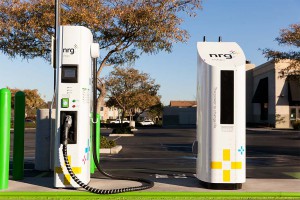There are three key factors limiting broader consumer acceptance of battery-electric vehicles, according to most analysts: their high price, limited range and the lack of a readily available charging network.
A new consortium, announced at this week’s L.A. Auto Show, could help resolve the latter issue. Dubbed ROEV, short for Roaming for Electric Vehicle charging, the new venture aims to make it easier for owners of battery-based vehicles to plug in wherever they go. It will let them access the vast majority of public charge stations without having to sign up with a variety of different service providers.
The goal is to “make sure every station is capable of serving every vehicle out there,” explained Brendan Jones, a vice president of NRG EVgo, one of the partners in the new charging consortium. “ROEV is reducing the barrier (to EVs by letting) people know they can charge anywhere.”
EVgo is just one of the 11 partners in the new project, a list that also includes charging station providers ChargePoint and CarCharging/Blink, as well as Nissan and BMW, two of the major automakers most heavily involved in electric vehicle technology. Between them, the participants operate about 91% of the charging stations open to the U.S. public, 17,500 in all. And the plan is to rapidly grow that number.
There are some key absences, notably Tesla Motors. The battery-carmaker has been setting up a nationwide network of its own, so-called “Superchargers” that provide Level III, 440-volt DC charging capability. That allows a vehicle like the Tesla Model S to get an 80% recharge in as little as 15 minutes.
(Live from LA! Click Here for full coverage of the 2015 LA Auto Show.)
While the Silicon Valley carmaker hasn’t yet joined ROEV, Tesla owners are “more than welcome” to sign up and use any of the consortium’s chargers, said Rob Healey, who oversees charging infrastructure for BMW and its representative with ROEV.
The goal is to make it as easy to charge any plug-based vehicle as it now is to use an ATM card, said Simon Longsdale, an executive with ChargePoint and the chairman of the ROEV consortium.
It’s not as easy as simply inserting a credit card in a charger, however. There are a number of different electrical connectors in use by different automakers. But ROEV is making a converter plug available to overcome that hurdle.
Automakers like Nissan and BMW, meanwhile, are pressing for the adoption of new industry standard plugs that will further simply the process.
Even so, there are a number of changes coming to the industry. With the exception of the longer-range vehicles offered by Tesla, most of today’s battery-electric vehicles can travel just 100 miles or less per charge.
But other manufacturers are racing to overcome that hurdle. General Motors has announced it will launch the new Chevrolet Bolt, with a 200-mile range, next year. And Nissan is expected to match that with a second-generation Leaf. Audi, meanwhile, is targeting more than 300 miles with the production version of the e-tron Concept SUV set to debut in 2018.
To handle those extended-range offerings, the ROEV partners are looking to upgrade to chargers using both higher voltage and higher amperage. In turn, that should slash charging times, another key issue with consumers.
ROEV has yet to work out a pricing strategy, but it wants to avoid premiums for any consumer subscribing to one of the participating members.
(GM expecting to see game-changing cut in battery prices. Click Here for more.)
As for the other challenge, automakers claim they’re seeing sizable reductions in the price of the batteries they’ll be using in the near future. GM expects to pay only around $145 a kilowatt-hour for the lithium-ion cells in the new Chevy Bolt – less than 20% of what it was paying for lithium cells at the beginning of the decade. Audi and others are targeting similar cuts.
That, industry planners believe, would make electric vehicles price competitive with conventional, gas-powered automobiles. If charging becomes as easy as filling a gas tank, the thought now goes, battery cars will have a much better chance of going mainstream.
(Elio Motors moves closer to launching 84 mpg, $6,800 three-wheeler. Click Here for the latest.)



It’s pretty obvious that auto makers know they are running out of time and will never be able to meet the absurd 54.5 mpg CAFE mandate by the politicians in DC so they need to do whatever they can to convince the public to buy EVs. As long as no tax payer money is spent to build the infrastructure or maintain it, then I’m OK with this desperation move by the auto industry. The inappropriate tax credits and other incentives that are paid by tax payers and non-EV buyers, must cease unless EV buyers want to pay for my car and my use of the roadways.
Even with the media hype and improper financial incentives, the auto industry isn’t going to convert many consumers to these impractical EVs. With a typical 300 mile range, hydrogen fuel cell powered cars are far more practical for someone who wants a low emissions vehicle. The chemical industry should be building refueling stations at conventional gas stations if they want to cash in as fuel cell cars become more available. (BTW, No vehicle is a zero emissions vehicle).
Had the auto industry invested as much effort in getting a realistic CAFE mpg mandate, they would not be left in the situation they find themselves now. I have no intentions of paying for the crimes of the politicians in DC.